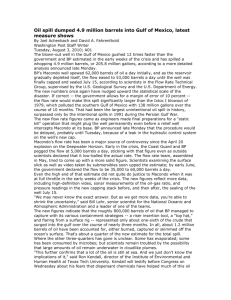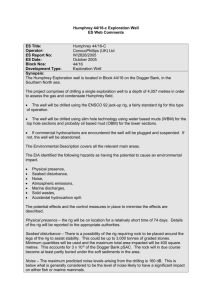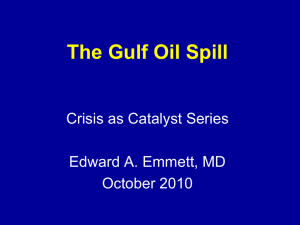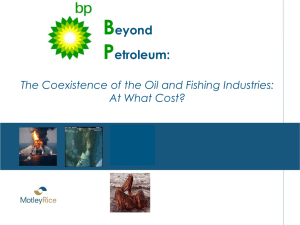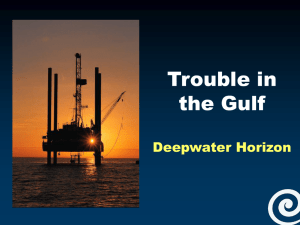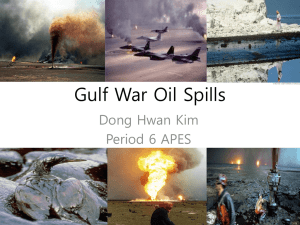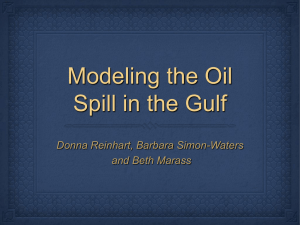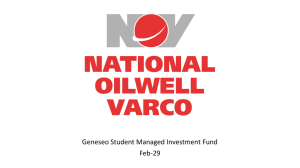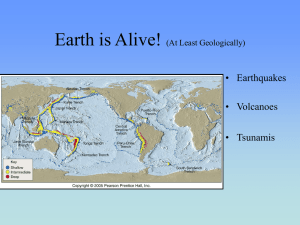PowerPoint (A history of oil extraction)
advertisement
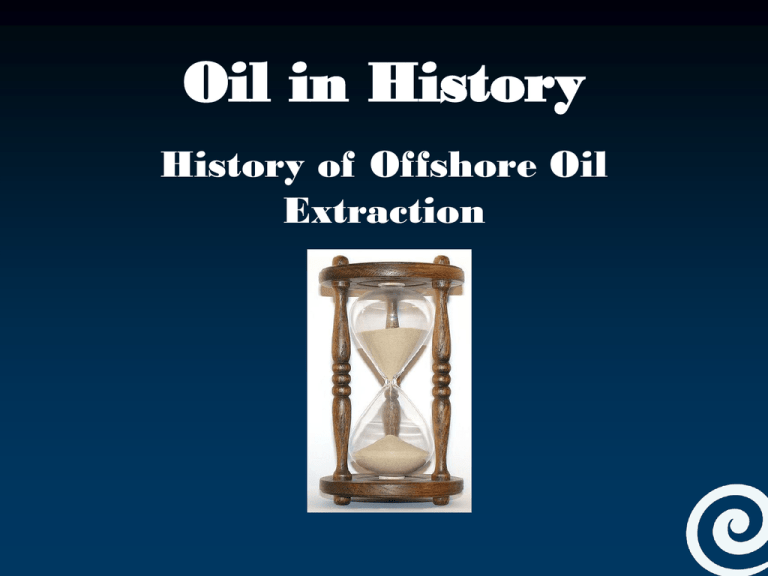
Oil in History History of Offshore Oil Extraction The need for light… The petroleum industry grew through the 1800s ~ becoming a leading 1st commercial international industry as the 20th century progressed. oil well drilled Saudiin Arabia Poland. Today’s top 3 oil producing countries: 1858 1st North American oil well drilled in Ontario, Canada 2000 + 1961 1950s 1946 Timeline 1937 1896 1891 1858 1853 Russia United States 80% of the world’s accessible reserves are in the Middle East. Saudi Arabia United Arab Emirates Iraq Qatar Kuwait 5 years later in 1896 ~ 1st ocean submerged oil wells drilled in California. 1891 oil was found off-shore. 2000 + 1961 1950s 1946 1937 1896 1891 1858 1853 The 1st submerged wells were drilled from platforms in Ohio. Kansas 1911 ~ note all the wooden barrels. 1919 Tanker used by Texaco 1911~ 1st true “off-shore” oil rig set on a fixed platform in 14 feet of water (but only 1 mile off-shore). In 1933 the process of locating oil (exploratory drilling) was revolutionized when a barge-mounted rig was designed to be moved from one location to the next with relative ease. 2000 + 1961 1950s 1930s 1911 1896 1891 1858 1853 This was the first mobile drilling unit. 1947 1st “beyond the horizon” oil rig. 11 fields By 1949, exploratory wells. were found in the Gulf of Mexico with 44 Compared to today… 3,858 active platforms CUSS 1 drillship 2000 + 1961 1950s drillship 1930s 1911 1896 1891 1858 1853 Semi-submersible platform Deepwater Horizon was a semi-submersible oil rig. There are specific platforms that perform better in particular water depths. Harsh conditions ~ remote locations Environmental risks Largest Offshore Oil Rig Spills Montara, Australia, 2009: An oil well in the Timor Sea, off the coast of Western Australia, began leaking, and the platform subsequently caught fire. The well spewed oil for more than two months, leaking as much as 2,000 barrels a day (6,216,000 gallons) for 74 days before it was capped, making it one of the worst spills in Australian history. Nowruz oil field, Persian Gulf, 1983: A tanker hit a rig off the coast of Iran, and the rig began leaking 1,500 barrels a day. Because Iran and Iraq were at war, the oil flow was not stopped, and the platform was later attacked by Iraqi warplanes. Later, a second platform was attacked, and initially spilled 5,000 barrels a day before slowing to 1,500. Two years passed before Iran capped the wells, but by then over 733,000 barrels (30,786,000 gallons) of oil spilled into the Persian Gulf. Santa Barbara, Calif., 1969: A blowout at a well five miles off the coast of Santa Barbara caused a leak that flowed for 11 days and 80,000 to 100,000 barrels (46,200,000 gallons) were released. According to a report by the University of California, Santa Barbara, the spill affected 800 square miles of ocean and coated 35 miles of coastline with oil. Ixtoc I oil spill, Gulf of Mexico, 1979: Generally considered the fourth largest oil spill in history, the Ixtoc spill occurred when the Mexican state-owned Pemex was drilling an exploratory well in shallow water in the Bay of Campeche. The Ixtoc suffered a blowout, and more than 3 million barrels (126,000,000 gallons) of oil gushed from the well for more than nine months before engineers were able to cap it. The spill contaminated more than 162 miles of beach in Texas. Gulf of Mexico, 2010: The Deepwater Horizon drilling rig exploded due to a methane gas release on April, 20, 2010, immediately killing 11 and injuring 17 platform workers. On July 15, 2010, the leak was stopped, however 206 million gallons of oil had already spilled into the Gulf. In addition to the oil, more than 1.8 million gallons of dispersant were released into the Gulf. List of Oil Spills: •http://en.wikipedia.org/wiki/List_of_oil_spills
